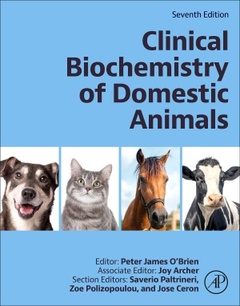Clinical Biochemistry of Domestic Animals (7th Ed.)
Coordonnateurs : O'Brien Peter J, Archer Joy, Paltrinieri Saverio, Polizopoulou Zoe S., Ceron Jose Joaquin

Clinical Biochemistry of Domestic Animals, Seventh Edition cements this book?s position as a standard text in its field, covering all aspects of biochemical abnormalities in domestic animals caused by various diseases. Here, across more than thirty chapters, leading researchers and pathologists provide accessible overviews and in-depth analysis of biochemical changes in the blood, urine, cerebrospinal fluid, joint fluids, other body fluids, and in cells impacting the health of domestic animals. Readers gain a full and nuanced understanding of biochemical changes underlying disease processes and learn to apply knowledge towards diagnosis and treatment. This new edition has been updated to address recent advances in the field, with all-new chapters on evolving technologies, big data approaches in research and clinical practice, clinical pathology profiles, translational biomarkers and biomarker validation, exotic animals, myocardial function, and tissue and body fluid biochemistry.
2. The clinical pathology profile
3. Translational Biomarkers – definition, characteristics, with a few classic examples of effective ones pancreatic lipase, cTnI, GLD, fructosamine, antioxidants and oxidative stress
5. Big Data
6. Allometry and adaptation and exotic animals
7. Diagnostic Enzymology of Domestic Animals
8. Fluid, Electrolyte, and Acid-Base Balance
9. Proteins, Proteomics, and the Dysproteinemias
10. Lipids and Ketones
11. Carbohydrate Metabolism and Its Diseases
12. Porphyrins and the Porphyrias
13. Iron Metabolism and Its Disorders
14. Trace Minerals
15. Vitamins
16. Clinical Biochemistry in Toxicology
17. Preclinical, Toxicologic, Clinical Biochemistry
18. Hepatic Function
19. Kidney Function and Damage
20. Gastrointestinal Function
21. Thyroid Function
22. Adrenocortical Function
23. Pituitary Function
24. Clinical Reproductive Endocrinology
25. Myocardial Function
26. Skeletal Muscle Function
27. The Erythrocyte: Physiology, Metabolism, and Biochemical Disorders
28. Hemostasis
29. Neutrophil Function
30. Clinical Veterinary Immunology
31. Tissue and Body Fluid Biochemistry
32. Concepts of Normality in Clinical Biochemistry
33. Comparative Medical Genetics
34. Lysosomal Storage Diseases
35. Tumor Markers
36. Cerebrospinal Fluid
37. Avian Clinical Biochemistry
After gaining masters and PhD degrees in biochemistry followed by post-doctoral research experience, Dr. Joy Archer spent many years doing laboratory and animal based medical research and teaching biochemistry to medical students. When Joy changed profession to veterinary medicine, she chose to specialize in clinical pathology and pathology as they are laboratory medicine-based specialisms. Joy’s academic positions have involved teaching veterinary and graduate students, diagnostic services, laboratory management and clinical related research. Joy was a founding Diplomate of European College of Veterinary Clinical Pathology (ECVCP) and a past president of the ECVCP. In 2013, she was awarded honorary Fellowship of the Royal College of Veterinary Surgeons, and in 2015 she was awarded the European Society for Veterinary Clinical Pathology Hall of Fame Award, both for her services to Veterinary Clinical Pathology.
Dr. Saverio Paltrinieri is a Full Professor of Pathology at the Department of Veterinary Medicine (Dimevet), University
- Explains the biochemical changes that occur in disease processes and provides rationale for applying this understanding in diagnosis and treatment
- Features chapter contributions from leading researchers and clinicians
- Includes a substantial appendix to quickly identify the reference ranges for a large number of animal species?
Ouvrage de 1144 p.
21.5x27.6 cm
Thèmes de Clinical Biochemistry of Domestic Animals :
Mots-clés :
Clinical Biochemistry; domestic animals; biochemistry of domestic animals; animal biochemistry; Immunochemistry; Translational Biomarkers; Enzymology of Domestic Animals; Lipids; Ketones; Carbohydrate Metabolism; Porphyrins; Iron Metabolism; Trace Minerals; Clinical Biochemistry; Clinical Toxicology; Reproductive Endocrinology; Veterinary Immunology; Normality in Clinical Biochemistry; Comparative Medical Genetics; Lysosomal Storage Diseases; Tumor Markers; Cerebrospinal Fluid; Avian Biochemistry



